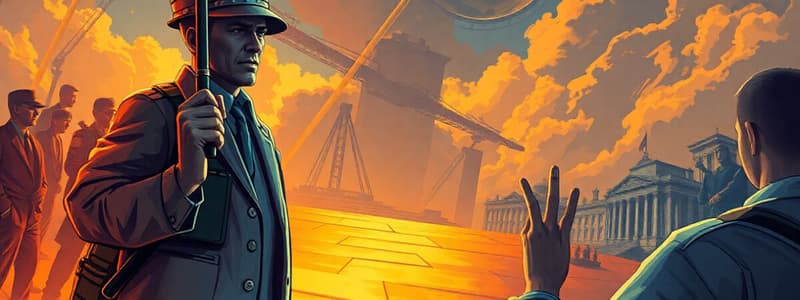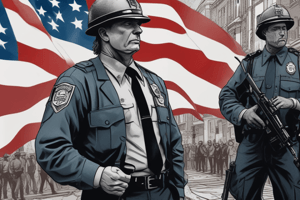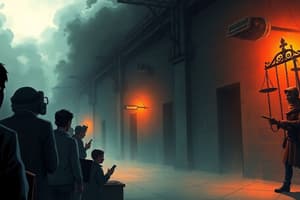Podcast
Questions and Answers
How are criminal justice decision makers selected in a democratic republic?
How are criminal justice decision makers selected in a democratic republic?
- They are chosen by the military
- They are all appointed by the President
- They are randomly selected from the general populace
- They are elected by the public or appointed by elected officials (correct)
Today, criminal laws are primarily based on common law rather than statutes.
Today, criminal laws are primarily based on common law rather than statutes.
False (B)
What era of criminal justice policy was initiated by the crack epidemic of the early 1980s?
What era of criminal justice policy was initiated by the crack epidemic of the early 1980s?
get tough era
The actions of elected officials have a direct impact on the __________, and the policies they implement affect how justice is done.
The actions of elected officials have a direct impact on the __________, and the policies they implement affect how justice is done.
Match the following terms with their descriptions:
Match the following terms with their descriptions:
What is a significant influence on the police department's style of enforcement?
What is a significant influence on the police department's style of enforcement?
Prosecutors are typically appointed and have no political affiliations.
Prosecutors are typically appointed and have no political affiliations.
What is the primary function of the Crime Control Model according to Herbert Packer?
What is the primary function of the Crime Control Model according to Herbert Packer?
The judicial system is often perceived as above __________ politics.
The judicial system is often perceived as above __________ politics.
Match the following aspects of criminal justice with their political influences:
Match the following aspects of criminal justice with their political influences:
Which of the following statements best describes the relationship between corrections and politics?
Which of the following statements best describes the relationship between corrections and politics?
The due process model prioritizes the suppression of crime over individual freedoms.
The due process model prioritizes the suppression of crime over individual freedoms.
What type of legal decisions do liberal judges tend to favor?
What type of legal decisions do liberal judges tend to favor?
What is the primary focus of the Due Process Model in the criminal justice system?
What is the primary focus of the Due Process Model in the criminal justice system?
The juvenile courts originally operated on an adversarial model, similar to adult courts.
The juvenile courts originally operated on an adversarial model, similar to adult courts.
What doctrine justified the state's involvement in the lives of children in the juvenile justice system?
What doctrine justified the state's involvement in the lives of children in the juvenile justice system?
The first juvenile court in America was established by the ________ Court Act of 1899.
The first juvenile court in America was established by the ________ Court Act of 1899.
Match the following characteristics of juvenile courts with their descriptions:
Match the following characteristics of juvenile courts with their descriptions:
Which significant change occurred in juvenile courts during the 1960s?
Which significant change occurred in juvenile courts during the 1960s?
Juvenile proceedings treated delinquents in much the same way as adult offenders from their inception.
Juvenile proceedings treated delinquents in much the same way as adult offenders from their inception.
Explain the dual methods of selecting criminal justice decision makers in a democratic republic.
Explain the dual methods of selecting criminal justice decision makers in a democratic republic.
Discuss the impact of the 'get tough' era on U.S. criminal justice policy.
Discuss the impact of the 'get tough' era on U.S. criminal justice policy.
How does the political process affect law-making in criminal justice systems?
How does the political process affect law-making in criminal justice systems?
Evaluate the relationship between policing and politics within police departments.
Evaluate the relationship between policing and politics within police departments.
Identify the primary consequences of the political influences on corrections in recent years.
Identify the primary consequences of the political influences on corrections in recent years.
Flashcards
Criminal Justice Policy
Criminal Justice Policy
Policy related to crime and punishment, involving conflict and debate in American politics.
Political System in Crime
Political System in Crime
The interplay between the president, congress, courts, bureaucracies, interest groups, elections, and media, influencing criminal justice.
Criminal Justice Decision Makers
Criminal Justice Decision Makers
People who decide punishments, often elected by the public or appointed by officials.
Politics of Law Making
Politics of Law Making
Signup and view all the flashcards
Get Tough Era
Get Tough Era
Signup and view all the flashcards
Politics of Law Enforcement
Politics of Law Enforcement
Signup and view all the flashcards
Political Prosecutors
Political Prosecutors
Signup and view all the flashcards
Political Judiciary
Political Judiciary
Signup and view all the flashcards
Politicized Corrections
Politicized Corrections
Signup and view all the flashcards
Crime Control Model
Crime Control Model
Signup and view all the flashcards
Due Process Model
Due Process Model
Signup and view all the flashcards
Political Prosecutions
Political Prosecutions
Signup and view all the flashcards
Elected Officials in Criminal Justice
Elected Officials in Criminal Justice
Signup and view all the flashcards
Due Process Model
Due Process Model
Signup and view all the flashcards
Juvenile Justice System
Juvenile Justice System
Signup and view all the flashcards
Parens Patriae
Parens Patriae
Signup and view all the flashcards
Juvenile Court Act of 1899
Juvenile Court Act of 1899
Signup and view all the flashcards
Adversarial vs. Non-Adversarial Courts
Adversarial vs. Non-Adversarial Courts
Signup and view all the flashcards
Formal vs. Informal Procedures
Formal vs. Informal Procedures
Signup and view all the flashcards
Juvenile Court Dispositions
Juvenile Court Dispositions
Signup and view all the flashcards
American Criminal Justice Politics
American Criminal Justice Politics
Signup and view all the flashcards
Criminal Justice Decision Makers
Criminal Justice Decision Makers
Signup and view all the flashcards
Politics of Law Making
Politics of Law Making
Signup and view all the flashcards
"Get Tough" Era
"Get Tough" Era
Signup and view all the flashcards
Politics of Policing
Politics of Policing
Signup and view all the flashcards




